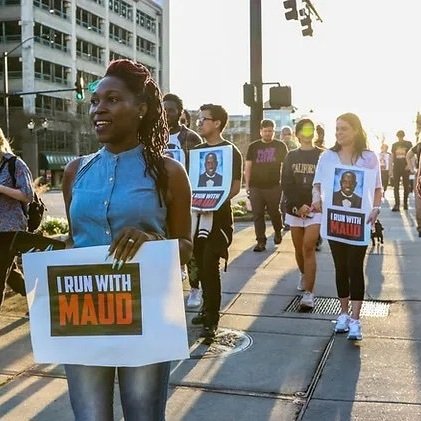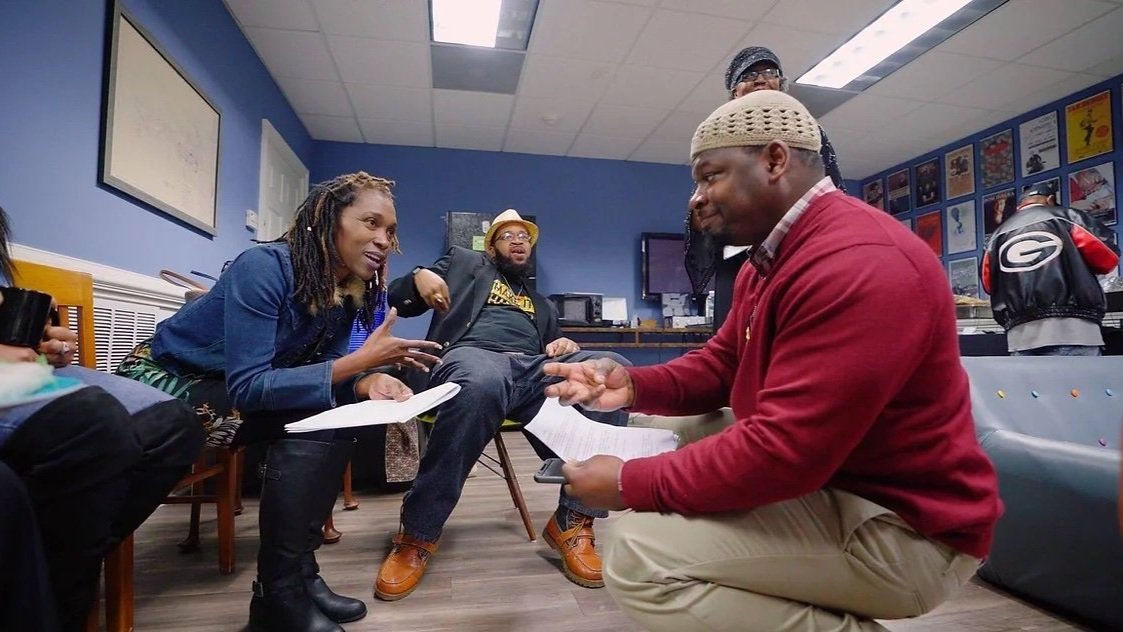This profile is about candidates for legislative districts we are targeting to flip in November. This profile is a Q&A with Mokah-Jasmine Johnson, who is running to represent District 120 in the Georgia House of Representatives. Johnson is running a joyful campaign focused on improving the economy, ensuring a quality education, human rights.
Her Term’s motto is ‘When she wins, everyone does’. What does that mean to you?
Through your leadership as a woman, you can inspire a lot of folks. Women have to play so many different roles — mother, wife, even candidate — and the positive influence that we have extends over our community, our family, our friendships, and society overall.
What inspired you to run for office? Was there a specific event or a chain of events that convinced you?
There’s a lot of work that needs to be done; there are a lot of injustices still being perpetrated. I run a nonprofit, the Athens Anti-Discrimination Movement, which provides social services and advocacy within our community. People reach out with issues around economic justice, discrimination, affordable housing, criminal justice reform, the youth being incarcerated.I'm constantly on the ground level, engaged in my community.
What we have been most successful with is bringing attention to different issues and turning that attention into accountability, action, and tangible change. We start by having deep conversations about the issues and teaching folks how they can mobilize and organize. That's what inspires me to run. That's what inspires me to keep going. And that’s my vision for Georgia, for Athens-Clarke County, and for House District 120.
Tell us about the positive change you're making just by running for election.
The number one change I want my campaign to drive, regardless of the outcome of this race, is making sure that I'm inspiring other folks to get involved. In 2020. There were various people who never voted for a State House seat and voted for the first time when I ran. They started to pay attention to our local politics.
My campaign, and me stepping up to run, inspired others to get involved in that same way. Two of the young ladies that ran for commissioner for the first time ran because I asked them to run. There's another young lady that now serves on the Public Safety Civilian Oversight Board, which my organization successfully advocated to be established, who'd never been involved in politics before. They were inspired by the campaign I ran in 2020.
You’ve talked about the importance of women’s voices throughout your campaign. How do you lift up those voices now and what will you do once elected?
I'm always going into spaces where we can bridge big gaps. Gaps with diversity, across racial lines, across ages. I continue to try to empower women to step up and lead.
The strict abortion bill that we have now in the state of Georgia – I know is an important issue to various women whether they're silent or vocal about it. Making sure their rights are protected in that area is a top priority to me. Also, as a state representative, making sure that women are paid equally, that people recognize that women matter, and that we deserve the same rights as men. I will be there to fight for their rights and to protect us.
Tell us why people should vote for you instead of your opponent.
I have a stronger track record of being able to get the work done than my opponent. I’ve been able to push for policy changes by rolling up my sleeves, not because I was a part of an elite network that helped carry me through.
The three major issues on my platform are economic recovery, education, and human rights.
People are being pushed out of Athens because of the affordable housing crisis. They’re not being paid more than minimum wage so they're not able to put food on the table. They’re not happy. I understand, first hand, what that stress feels like.
As an educator, one of my top priorities is making sure that the school system is fully funded. I want to ensure teachers are being paid fairly, the administrative staff is being supported, and the retirement system is fully funded.
I believe that no one is free until we are all free. Regardless of who you are, where you came from, how you self-identify, how you want to create your lifestyle — your human rights and your livelihood should be respected. I will fight for human rights for all Georgians.
Running for office is not something that's comfortable for me. I'm making that sacrifice because of the people who are going unheard and I know are suffering in the community because the government isn’t doing anything to address their needs. That is why I'm in it.
Could you elaborate on the policy changes you’ve achieved so people who aren’t familiar can get a flavor of what you've accomplished?
There are strong accomplishments that I've had in our community – especially as someone who does not have a political background or family ties in politics.
I jumped into activism in 2015, because a bar in Athens-Clarke County was selling a beverage named for a racial slur. That was the start of it all. We successfully advocated for an anti-discrimination bill, which was officially established by the Athens-Clarke County government. Itstates bar owners in downtown Athens would be fined or could lose their liquor license if they were caught discriminating on any grounds. Our advocacy also inspired Athens-Clarke County to establish a diversity and inclusion office.
In 2019, we were successful in establishing a cash bail ordinance, The Freedom Act of Athens-Clarke County. Folks were being charged and arrested for local ordinances like loitering or low misdemeanor minor offenses. It was a humiliating, drawn-out process that affected their livelihoods over very low-level charges. The ordinance eliminated that burden completely. We now have a pre-arrest diversion program where, depending on the charge, the officer can give a ticket as opposed to the person being fingerprinted and going into the system.
Other achievements include establishing the Athens Anti-Discrimination Movement’s End School-to-Prison Pipeline Program and the Teen Social Justice Club. Athens-Clarke County now has a Public Safety Civilian Oversight Committee and a Human Rights Committee that were created after years of our advocacy. On Father's Day, we did $20,000 worth of bailouts supporting incarcerated fathers. We got the Confederate monument removed from downtown Athens and advocated for formal recognition of the slave bones that were found buried on the University of Georgia’s campus under Baldwin Hall. There’s a lot of work I’ve contributed to, and I’m nowhere near finished.
What can people do today to help your campaign?
We need people to donate to make sure that we can communicate, reach our audience, and get our message out. We need people to help with canvassing, postcard writing, and phone banking.
At the end of the day, I’m just appreciative of whatever people can contribute – whether it's time or finances, all those things help.




